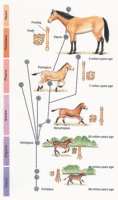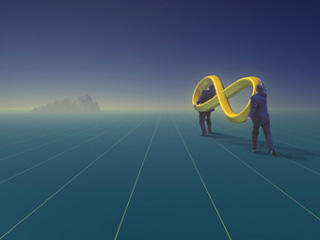Thursday, September 29, 2005
Wednesday, September 28, 2005
Walking with Angels
Monday, September 26, 2005
Free Game Download!
Anyhow, this is a great offer by yours truly. Yes, in my murky past I somewhere learnt to program. This may surprise any repeat visitors here as it isn't entirely in accordance with my otherwise entriely non-geeky image. Right?

But seriously, I programmed this entire game, a little while back, and I'm now giving it away for free. It's worth two minutes of your time most probably, and if anyone really likes it then perhaps I'll work on it a bit longer and make it better.
It was programmed in Visual Basic and I'm happy to show the source code to anyone who's interested.
All comments/criticism/suggestions etc very welcome.
Please note, you MUST extract the files to the folder c:\VB98, because I really am too lazy to work out how to make it self-extracting.
Saturday, September 24, 2005
Human Transcendence of Biological Evolution

Monday, September 19, 2005
Results Day

You emerge onto the street. Everyone around has their daily lives. Nothing significant is happening to them. You are probably pale now, your mouth is very dry. You know from your psychology exam that this is a natural reaction to fear. Since you know so much about psychology, you were probably fine. Your breathing increases and you start to sweat, but this is no doubt a side effect of walking quickly. There is so little between you and that white board with figures and letters. A short walk, a short tube journey and one more short walk.
A man and a woman approach you, smiling as though angels walk amongst us. Truly enough they are South African missionaries advertising their latest music and dance celebrations of god at Wembley stadium. Stern faced at first you force a smile and say you will think about it. They smile and nod, blessing you.
On the tube you ponder god and the influence he may exert over your fate. Considering that the results are up there waiting for you to simply see them, you know that he is irrelevant. You know you are desperate when you pray for something impossible from someone you don’t believe in…
Down the street now, nothing but concrete and steps between you and it. You consider that if there were a league dictating the most stressed people on the planet then you would have risen into the top area after spending forever at the other end. Strangely you cannot place any confidence in this result, one way or the other. You have done well and worked, but you feel oddly as if there might be a surprise ahead.
Up the final flight of stairs, you can hardly breath. You feel truly sick. Around the corner looms the notice board. You could turn now and never look. Life could go on and nothing would change, in the end though, you are more scared not to look. Momentarily you cannot find your number in the display. You find it, but hope it is another’s.
Sunday, September 18, 2005
Superbly Weird Neutral Cult
- I'm a lot stupider than I thought.
- Whoever wrote this shit is really really smart and has come up with his own philosophy near enough from scratch.
- The person who wrote this is insane and it really does make no sense.
- The person who wrote this is very good at writing stuff that sounds clever but means nothing.
Would this final option actually be the ultimate irony I wonder?
Check out the site's short stories, it's all quite fascinating in a truly surreal way.
Thursday, September 15, 2005
A Tree Falls in the Desert...
So is the variation I heard today on the classic philosophical poser.
1) What bloody tree? This is a goddamn desert! Deserts have sand, not trees!

[Except this one]
2) Of course it does...
3) ... Unless of course you actually believe that the world only exists in so far as humans are there to perceive it. For me, if you're going to go this far, you should really say 'If I am not there to hear it, does it make any sound?'
I find it easier to conceive of everything being a figment of my personal imagination rather than everything being a figment of humanity's imagination. But imagine the reverse! One massive inconceivable self-deception - humanity believes in sound, but 'sound' does not exist!
Rock on! (Although I suppose it's rather hard to 'rock on' without sound...)
Wednesday, September 14, 2005
Guest Cartoon

This cartoon has been written, designed and scripted specially for A Neutral World? by Nick James, of World of Why?
Sunday, September 11, 2005
Is Judas actually Neutral?

Saturday, September 10, 2005
Hattrick

It's basically an online football management game, but it's the very best I've come across. One amazing feature is its truly international nature. There's literally some guy out in Malaysia somewhere who pulls some kid out of their youth system and then you, in England, can buy the guy. Everyplayer in the game comes from somebody's squad. It's sweet.
Is it neutral? Hmmm... Well, currently around 600,000 people play it worldwide. That number seems consistenly on the increase.
n = # of people playing hattrick.
p= world population.
I hypothesise that as n ---> p, hattrick -----> neutral.
In other words, there would be an even spread of hattrick globally. It would become an alternate reality and then it would cease to possess and value, but would instead play host to a set of internal values (the players.)
A bit 'Brave New World', I know, but you've gotta spice up a basic plug somehow eh?
Wednesday, September 07, 2005
Google Advertise Poker Cheat!
 About a month ago I was surfing Google when I found a 'sponsored link' to a page that promised the key to guaranteed online poker winnings. I decided to take a look, since I like poker, and I like money. I was also curious because I faced two conflicting things:
About a month ago I was surfing Google when I found a 'sponsored link' to a page that promised the key to guaranteed online poker winnings. I decided to take a look, since I like poker, and I like money. I was also curious because I faced two conflicting things: - My opinion that one never gets anything for free.
- My trust for Google.
The link opened up and gave a massive spiel about making money online, with loads of '3rd part testimonials', the usual. Then it showed a screen shot which suggested that with this software one might be able to see all the cards one's opponents were holding. Underneath this picture it explained, quite correctly, that if you can see everyone's cards, how can you lose? A little further down it insisted that all the program (selling for $60) did was legal.
Now, being a lawyer, I concluded fairly quickly that looking at other people's cards and thereby winning was most definately obtaining a pecuniary advantage by deception (stealing). On the other hand, I knew this was a Google-sponsored link, and I thought, surely Google wouldn't advertise something illegal?
I did some research into it and discovered, quite unsurprisingly, that it was all a big scam. In order to use the program 'legally' you first have to get all the players around the table to agree to installing your program and letting you use it! HAHAHAHA! Seriously! Yeah.
So basically this is all about cheating, stealing and scamming. As my friend said, if he could do all that legally why did he want $60 from us, why didn't he just win an infinite amount with his strategies?
Anyway, I wrote to Google about it, complaining and suggesting it was harming their reputation (had already in my mind). They wrote back saying they would investigate and yet today the site is still a sponsored link: http://www.cheat-at-poker.com/
Shocking. Have a look and laugh.
Tuesday, September 06, 2005
The Dice Man
 Have any of you read this 70s cult classic? If not, then you should. It should appeal to anyone with half a brain (except children - it's far to corrupting and lewd for them).
Have any of you read this 70s cult classic? If not, then you should. It should appeal to anyone with half a brain (except children - it's far to corrupting and lewd for them).Monday, September 05, 2005
Pleasure!
A student of Plato (and foreshadow of Euclid's geometry books) called Eudoxus claimed that pleasure was the supreme good. His reasoning for this was that all living things seek it.
Plato once said that pleasure + intelligence = something better than pleasure.
Aristotle used this argument to say that pleasure can be surpassed by addition of another 'good' and so it was not supreme of itself.
For once I'm briefly going to dare to criticise Aristotle's reasoning: the result of Plato's equation, though it may be greater than its parts, is still a form of pleasure (as, for example, where cold water is placed in a fridge, it gets colder, but it is still cold water). Clearly when Eudoxus claimed that pleasure was the supreme good, he intended that his definintion of 'pleasure' should include all degrees of pleasure.
Further, Plato's equation is subjective. For many people pleasure + intelligence <= pleasure. It rather depends upon the drives of the individual. As for me, I would also argue against Eudoxus on this basis: he defines pleasure as something all creatures seek, with reason, or without. To seek pleasure without reason is to succumb to impulsive short term desires. As anyone can see, short term goals desires (shagging you girlfriend's best friend) can very easily lead to long term disasters (being dumped by both girls and living a life of lonely infamy). In other words, pleasure without reason is not necessarily good in any proper sense, either ethically or practically. To say all creatures seek it and so it is good is a patently silly argument.
Finally: is pleasure neutral?
 a) Pleasure gives people happiness (sometimes short term, sometimes long term).
a) Pleasure gives people happiness (sometimes short term, sometimes long term).b) Pleasure causes pain and suffering (Eating ---> Obesity ----> Death). [see diagram on left]
Conclusion: pleasure has many drawbacks, but what is life without it? It can give life and death. I therefore conclude that it is not neutral but a variation on neutral - ambivalent.
Perhaps I should rename the site An Ambivalent World? ... On the other hand, not enough people really know what the word ambivalence means.
Sunday, September 04, 2005
Neutrality in the 40s...

Of bein' intellectual
And so, instead of gushin' on,
Let's have a big discussion on
Timidity, stupidity, solidity, frigidity,
Avidity, turbidity, Manhattan, and viscidity,
Fatality, morality, legality, finality,
Neutrality, reality, or Southern hospitality,
Pomposity, verbosity,
You're losing your velocity,
But let's not talk about love.
- Let's Not Talk About Love - Cole Porter
Friday, September 02, 2005
Original Intergrity...
 I try to write (some of which appears/will appear here.) One problem I face in my writing is an almost compulsive need to be original in what I write.
I try to write (some of which appears/will appear here.) One problem I face in my writing is an almost compulsive need to be original in what I write.Thursday, September 01, 2005
The Best 'Best'.
 Isn't it a requirement of really living to want to be the best at something?
Isn't it a requirement of really living to want to be the best at something?